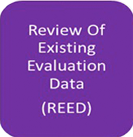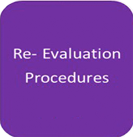en Español • Share • 
If your child has an Individualized Education Program (IEP), he or she has already received a Full and Individual Initial Evaluation (FIE). The FIE is the initial evaluation that took place when your child was first referred for special education services. During the evaluation process, the school used a variety of assessment tools and strategies to determine that your child met the IDEA definition of a “student with a disability” and was eligible to receive special education and related services. It also helped the ARD Committee develop an IEP based on your child’s individual needs.
If it has been several years since your child has been evaluated, or if you or the IEP team feels there has been a change in his or her educational or related service needs, it may be time for a Reevaluation.
Why Reevaluate?
A reevaluation is key to measuring the effectiveness of your child’s IEP over time. It is an opportunity to track your child’s progress and gather data to determine if the child has benefited from the services he or she has received. By using similar assessment tools in the reevaluation process, you should be able to measure progress by comparing data from the last evaluation. If you do (or do not) see progress, the ARD committee may need to revise the teaching strategies, methodologies, programming, or your child’s goals.
When should a child be reevaluated?
The law makes it very clear that the parent plays an important role in determining when your child needs to be reevaluated. According to the IDEA:
- A reevaluation can occur no more than once a year per discipline (for example, one speech evaluation per year, one occupational therapy evaluation per year, one physical therapy evaluation per year, etc.) – unless the parent and the district agree otherwise.
- A reevaluation must occur at least once every three years. The exception would be if the parent and the school agree that a reevaluation is unnecessary. Parents should note that it is within your rights to disagree with a school’s decision to waive the three-year evaluation if you feel if a reevaluation is appropriate for your child.
In addition, a reevaluation is required before any change of placement, unless your child is graduating under option 1 or 2 or aging out of services. For a student graduating with an IEP, the reevaluation should be included as part of the Summary of Performance.
Reevaluation Process
A reevaluation must be sufficient to determine your child’s present needs, educational progress and achievement, access to the general curriculum, and continuing eligibility for special education services.
A reevaluation should start with a Review of Existing Evaluation Data (REED), including:
- Evaluations and information provided by the parents of the child;
- Current classroom-based, local, or state assessments, and classroom-based observations;
- Observations by teachers and related services providers.
Parents should note that a REED is NOT a reevaluation. A REED is the starting point of a reevaluation. Based on a review of the existing evaluation data, along with input from you, the ARD Committee must identify any additional information needed to determine:
- Whether your child continues to be “a child with a disability” and the educational needs of your child;
- Whether your child continues to need special education and related services;
- The present levels of academic achievement and functional performance of your child (PLAAFP); and
- Whether any additions or modifications to the special education and related services are needed to enable your child to meet the measurable annual goals set out in his or her IEP and to participate, as appropriate, in the general education curriculum.
If additional data is needed, the school will get your consent to perform the additional evaluations.
Unlike initial evaluations which have an established timeline for completion once consent is signed, there is no timeline for reevaluation completion. The ARD Committee, which includes you, should determine the evaluation completion date. Therefore, it is important for you to ask when the evaluation will be completed and get this date documented within the IEP paperwork.
NOTE: If this is a 3 year reevaluation, the evaluation & resulting report should be completed by the three year anniversary date.
No Additional Data Needed
If the ARD Committee, which includes you, determines that no additional data are needed beyond the REED to complete the evaluation, the school must tell you in writing of this decision and the reasons for the determination. They should also let you know that you have a right to request an evaluation (see Procedural Safeguards).
NOTE: In this case, the date of the completed REED becomes the date of the newest Full Individual Evaluation (FIE).
At this point, the school is only required to proceed with further testing at the parents’ request. Therefore, parents should make any requests for further assessment in writing and in a timely manner.
What Parents Need to Know
As part of the REED process, the ARD committee, which includes the parent, determines what additional assessments, if any, are needed to document your child’s educational needs. While parents have knowledge of their children, they often don’t know what assessments are needed.
There are a variety of tools to use to think about what additional information may be needed by the ARD committee. We have included two tools in the resource section that provide the ARD committee, which includes the parents, a framework for gathering more information about your child that is otherwise difficult to measure within a formalized assessment process. The information gathered through these tools is usually recognized by various members of the ARD committee, but often not effectively documented within the child’s special education formal records.
Before the REED discussion, a parent may go through either of the tools and select some areas where additional data may be required. During the REED process, the parent can pose the questions and the ARD committee can document the answers to the questions within the REED framework or determine that additional data is needed.
If additional information is required, the questions can be answered by a number of people who work with your child in a variety of settings and activities. While schools are not required to use these tools, the ARD Committee can recommend using the questions asked by the parent to gather and document additional information needed to make educational decisions about your child.
Final Note –
Parents - make sure you receive copies of your child’s evaluation results and read this information thoroughly BEFORE the ARD committee meeting. If there is something you don’t understand, make an appointment with your school diagnostician or other assessment personnel to go over the report with you. Keep all assessment reports in a notebook or file so that you can refer back to it often.
In the event the reevaluation is conducted and you have a disagreement with the school regarding the assessments used or the findings, you have a right to request an independent educational evaluation (IEE). An IEE is conducted by an examiner that is not employed by the school district. In many cases, the school district will pay for the independent evaluation.
All ARD Committee decisions for your child should be based on current evaluation data, so it is critical that this information is accurate and up-to-date. If it has been three years since your child’s last evaluation, or if you feel that information contained in the REED no longer reflects an accurate picture of your child, it is time for you to request – in writing – a formal reevaluation.
Legal Framework for the Child Centered Process:
Region 20 ESC - Special Education Reevaluation Process Flowchart
TARGET Manual (Texas Statewide Leadership for Autism) – Evaluation Procedures: While the information provided here is specific in relation to students with autism, ANY parent can use the information to learn about the variety of assessments available.
Center for Parent Information & Resources - Training Module 10: Initial Evaluation and Reevaluation
U.S. Dept. of Special Education, Office of Special Education Programs - Changes in Initial Evaluation and Reevaluation
Tools:
- Assessment of Student Participation in General Education Classes. Classroom assessment tool from Macdonald, C., & York, J. (1989). Regular class integration: Assessment, objectives, instructional programs. In J. York, T Vandercook, C. Macdonald, & S. Wolff (Eds.), Strategies for full inclusion (pp 83-116). Minneapolis : University of Minnesota, Institute on Community Integration; reprinted by permission
- Functional Contextual Assessment (FCA) questions by LR Consulting (pdf) used to document a child’s unique learning style, skills and abilities, and for identifying effective instructional strategies. We recommend only selecting a few of the questions based on your child’s area of need, and then using those questions at each reevaluation as your child progresses through school. Questions can be tailored, as appropriate, to your child. In fact, they can be reworded slightly at transition age to help plan for post-secondary education or training, employment or independent living. (Used with permission ©1999, MAXIM, Linking Functional Assessment to Instructional Process; Fitzgerald, Johnson, Lasater; LR Consulting).







